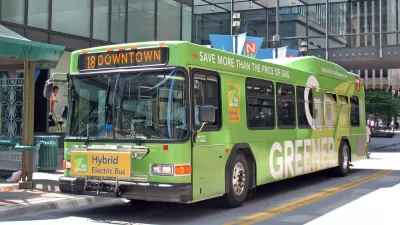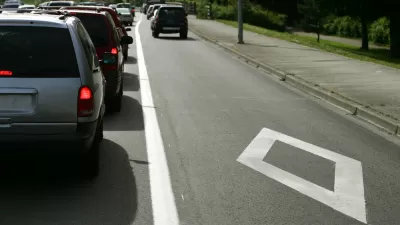The auto may no longer be "the quintessential symbol of American mobility, status and independence," opines Robert J. Samuelson for The Washington Post, as the latest demographic and auto ownership data point to a change in American mobility.

"Now there are signs that the car and its many offshoots (SUVs, pickup trucks) are losing their grip on the American psyche and pocketbook," writes Samuelson, economics columnist for The Post.
The car culture may be dying or, at any rate, slumping into a prolonged era of eclipse. The only question is whether the signs of change can be believed. It’s not clear.
Clearly SUVs and light trucks have not lost favor with American passenger vehicle consumers, as 2015 sales numbers show. Samuelson's observations do appear to hold up, though, for compact cars, hybrids, and electric vehicles, sadly (from an environmental perspective), as "crossovers replace the family car."
Fewer drivers
"Just recently, the Federal Highway Administration (FHWA) published figures — first reported on the Atlantic magazine’s CityLab website — indicating that the number of licensed drivers 16 or younger in 2014 had dropped 37 percent since 2009 and, at 1.08 million, was 'the lowest number since the 1960s," writes Samuelson.
More impressive, the trend seems long term. A report from the Highway Loss Data Institute [supported by the auto insurance industry] cites studies showing that from 1983 to 2010 the share of 16-year-olds with a license fell from 46 percent to 28 percent; over the same period, the share of licensed 17-year-olds declined from 69 percent to 46 percent .
"It's not only young adults who are delaying in getting drivers licenses, but a drop in licenses among [almost] all age groups according to a new analysis of license data from 1983-2014 by the University of Michigan Transportation Research Institute," notes a January post here. "The only age group to show a slight increase (in drivers licenses) since 2008 is the 70-and-older crowd," according to UMTRI."
Auto ownership
Samuelson provides various reasons for the decline in youths with drivers licenses, debated here as well, and points to "a new study by Federal Reserve economists Christopher Kurz, Geng Li and Daniel Vine...[that] suggests that most potential young buyers couldn’t afford a new vehicle or didn’t want to incur the debt and operating expenses of doing so. Economic considerations dominated." Of course, there's a major difference between getting a license and owning a motor vehicle.
Whether it be economic or cultural, the trends are pointing to a lessening in the nation's systemic auto addiction. But Samuelson ends on a sober tone.
"We simply don’t know," he writes, referring to the future of American mobility.
What we do know is that we are, to a large extent, prisoners of the past. The car created today’s residential geography, and it cannot be repealed simply or swiftly.
Hat tip to Kenyon Karl.
FULL STORY: Opinions: Is the car culture dying?

Alabama: Trump Terminates Settlements for Black Communities Harmed By Raw Sewage
Trump deemed the landmark civil rights agreement “illegal DEI and environmental justice policy.”

Study: Maui’s Plan to Convert Vacation Rentals to Long-Term Housing Could Cause Nearly $1 Billion Economic Loss
The plan would reduce visitor accommodation by 25% resulting in 1,900 jobs lost.

Why Should We Subsidize Public Transportation?
Many public transit agencies face financial stress due to rising costs, declining fare revenue, and declining subsidies. Transit advocates must provide a strong business case for increasing public transit funding.

Wind Energy on the Rise Despite Federal Policy Reversal
The Trump administration is revoking federal support for renewable energy, but demand for new projects continues unabated.

Passengers Flock to Caltrain After Electrification
The new electric trains are running faster and more reliably, leading to strong ridership growth on the Bay Area rail system.

Texas Churches Rally Behind ‘Yes in God’s Back Yard’ Legislation
Religious leaders want the state to reduce zoning regulations to streamline leasing church-owned land to housing developers.
Urban Design for Planners 1: Software Tools
This six-course series explores essential urban design concepts using open source software and equips planners with the tools they need to participate fully in the urban design process.
Planning for Universal Design
Learn the tools for implementing Universal Design in planning regulations.
Caltrans
Smith Gee Studio
Institute for Housing and Urban Development Studies (IHS)
City of Grandview
Harvard GSD Executive Education
Toledo-Lucas County Plan Commissions
Salt Lake City
NYU Wagner Graduate School of Public Service




























